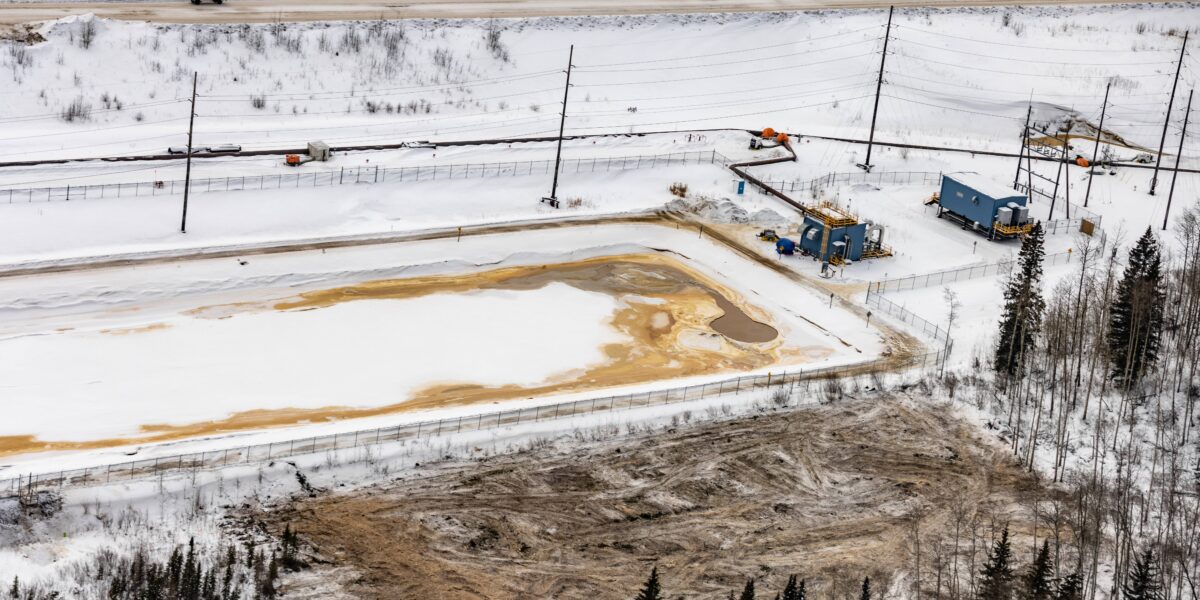One of the largest toxic tailings spills recorded in Alberta’s history left Athabasca Chipewyan First Nation (ACFN) in a dire situation. On February 4, an overland breach of 5.3 million litres of toxic tailings spilled from the Imperial Kearl mine into the Athabascan watershed.
But the impact of Imperial Oil’s tailing ponds run deeper. Since May 2022, four separate tailing leaks at Imperial’s Kearl mine site have been seeping into the Athabascan watershed, leaving the people of ACFN wondering why they were left in the dark for so long.
“[ACFN are] angry that they’re only finding out about this. The community people literally didn’t know. They’re rushing around to inform the community people that there’s this huge, massive toxic spill that happened,” said Jesse Cardinal, executive director of Keepers of the Water in an interview with rabble.ca.
Both Alberta Energy Regulators (AER) and Imperial Oil failed to inform surrounding communities of the imminent danger. Under the impact and benefit agreements made with ACFN, Imperial Oil is obligated to address any adverse effects from industry activities on Indigenous communities.
Official statements from AER and Imperial Oil continued to minimize the environmental impact, claiming that the overland spill did not affect the waterways or any wildlife in the region. According to AER’s statement, Imperial Oil is compliant with the Environmental Protection Order (EPO) that was issued on February 6 to address the overland spill.
“The reality is [that] the peatbogs, marshlands and fens go right into the groundwater systems and into the aquifers in the region. [Imperial Oil] have done no studies to look at how expansive the impacts of this breach were,” said Eriel Deranger, a member of ACFN and executive director of Indigenous Climate Action, in an interview with rabble.ca.
When ACFN did a flyover of Imperial Kearl mine and the cleanup site, the toxins were still present—they also spotted moose near the site where the oil spill and the ongoing tailing leaks are taking place.
“This raised the alarm bells for the community to ask everyone to ensure that they are not harvesting animals from in and around that region. We are now looking to test any of the harvests that they may have from the last year from the region,” said Deranger.
ACFN raise concerns on traditional food supply and the environmental impact
Traditional food is crucial for Indigenous communities, including ACFN. Hunting and harvest seasons last year-round for ACFN, and Indigenous people have relied on traditional food to keep them healthy ,Cardinal said. But now with the discovery of ongoing tailing breaches since last year, the ecosystem and wildlife living in those areas are possibly compromised.
“That’s the irony in this all is that people don’t fully understand how traditional foods keep us healthy. If you have, like low iron, then you eat the liver of the moose—their ‘s is different, and so when we eat the organs, there’s a reason why we’re eating them … Our food is our medicine,” said Cardinal.
ACFN are currently in the process of collecting food from the community for further testing.
Again, ACFN and Indigenous communities are left to raise the alarm on the environmental and human impact of tailing ponds despite extensive research noting the risks of these operations.
“We’ve known for decades that tailings are dangerous to the ecosystem and they’re prone to these types of breaches and leaks. There was a call to phase out because of that, a commitment from industry and government to make that happen—and it has not happened,” said Deranger.
A report from AER indicated that oilsands tailing ponds have actually increased by 90 million cubic metres in 2020.
“In fact, the tailings have grown. The incidents are so regular that communities are—we are desensitized to these impacts [when they] happen. That people just like shove it off,” said Deranger.
Trust is broken, once again
Although AER and Imperial Oil have stated they want to improve relations and consultations with Indigenous communities, Cardinal and Deranger have doubts—with their inaction and lack of communication, the damage has already been done.
Now, Deranger has warned about the provincial government’s efforts to amend tailing management policies which would permit industry to dump tailings back into the water system.
“They don’t want to report this stuff or say that it’s a problem because it would affect their ability to examine this legislation that they’re currently trying to push through—and this legislation’s bottom line is to save money for the industry,” said Deranger.
The ongoing tailing leaks at Imperial Kearl mine were swept under the rug by both AER and Imperial Oil—these incidents went largely unnoticed for nine months. In terms of Imperial Oil’s containment and cleanup efforts, they are unsustainable to say the least.
“What’s concerning is what else is happening all over Alberta? It’s become so normalized to contaminate our environment that we have become so disconnected to the land and water—so arrogant that we think that we are above nature that we can just continue contaminating and that it’s going to continue keeping us alive,” said Cardinal.
These continued efforts from industry to subvert Indigenous rights, while putting profit over people is nothing new—and Cardinal is tired of it.
“You get angry and shocked. But now at my age, I see this has been a systematic, ongoing tactic of the government to try and impose their colonial structures and powers on Indigenous people,” said Cardinal. “This has been ongoing in history. That’s literally why we’re alive today because Indigenous people have been on the frontline to push back against genocide for centuries now—we’re still here and we’re going to continue pushing back.”



